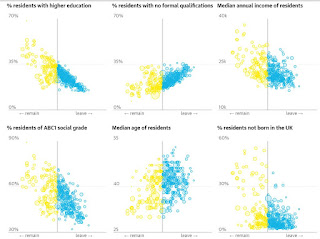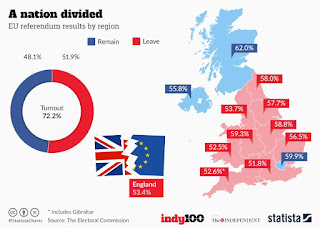O voto dos mais velhos e dos mais pobres/menos educados pesou fortemente na Inglaterra, assim como o voto identitário: Quanto mais inglês e menos Britânico, mais forte o voto pelo #Brexit.
In England, 2/3 who consider themselves “more English than British” voted L; 2/3 of “more Brit than Eng” voted R pic.twitter.com/xxZCXeGaKu— Lord Ashcroft (@LordAshcroft) June 24, 2016
É preciso ter em mente que muitos dos votos da classe operária pelo Brexit, mesmo que diante do temor da imigração, não é, em si, racista, mas é mais fácil chamá-lo dessa forma do que lidar com a raiz dos problemas.
From my research I would argue that the referendum debate within working-class communities is not about immigration, despite the rhetoric. It is about precarity and fear. As a group of east London women told me: “I’m sick of being called a racist because I worry about my own mum and my own child,” and “I don’t begrudge anyone a roof who needs it but we can’t manage either.”
A Europa merece muitas críticas, mas é na união que se faz o debate e não cada um por si.
A people divided. Even within the high education / low Leave pattern, regional divides are stark. #Brexit pic.twitter.com/0TynZS1oSa— John Burn-Murdoch (@jburnmurdoch) June 24, 2016
Regions with the biggest votes for Leave are also the most economically dependent on the EU https://t.co/vL2D3SkEIP pic.twitter.com/gUjDX64OY3— Financial Times (@FT) June 24, 2016
 |
| O voto dos que se sentiram excluídos e vítimas de políticas de austeridade |
E isto pode colocar em perigo o processo de renascimento da língua Córnica. Na verdade o Brexit coloca em perigo a sobrevivência de línguas minoritárias como o Galês, o Gaélico (irlandês e escocês), o Scots e o próprio Córnico.
“If our countries left the European Union, we would be excluded from the rights shared by European citizens. We would furthermore be at the mercy of governments that have shown neither the interest nor the desire to protect and promote the rights of speakers of our nations and regions’ languages, and have throughout much of our shared history conducted aggressive language policies designed to eradicate our languages.“Neither would we have access to European language project funding, which would be detrimental to non-governmental and educational bodies.“Leaving would impede our young people’s prospects and employability; European funding has offered vital investment for many of our communities’ economies.“The EU has been, and can be further still, a great bastion of hope for the minoritised languages of our countries.”
Como já disse, a UE merece críticas, muitas, mas a desintegração não é o caminho. Melhor o trabalho dentro de marcos comuns, de um processo de integração, do que cada um por si. É mais fácil (ou talvez menos difícil) buscar mudanças por dentro de um processo de integração ou de um bloco integrado, do que cada um no seu quadrado.
Enfim, meu sentimento, compartilhado por muitos:
The entire world watching #brexit: pic.twitter.com/qKGImKnTaz— Laurie Voss (@seldo) June 24, 2016




Deixe um comentário